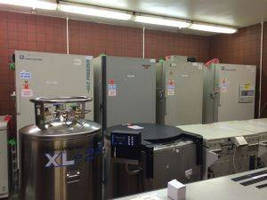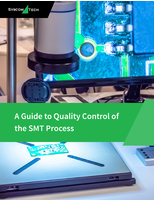AIDS Research Lab Receives Lifetime Accsense Temperature Monitoring

Accsense Temperature Monitoring Systems for Biorepositories and Clinics
CHESTERLAND OH — CAS DataLoggers has just granted the University of Southern California's Maternal, Child, and Adolescent Virology Research Laboratory a Lifetime Monitoring Subscription for their Accsense Temperature Monitoring System. Laboratory Manager Patricia Anthony, CLS, MT (ASCP) explains, "Our lab operates on a small NIH budget (Natl. Institute of Health) for pediatric AIDS research as part of IMPAACT (International Maternal Pediatric Adolescent AIDS Clinical Trials Network.) Even with the most recent publicity of the Mississippi baby's and the Long Beach baby's need for a cure from Dr. Anthony Fauci and Dr. Deborah Persaud, a fellow IMPAACT researcher, funding has decreased significantly in recent years and we have been forced to cut our staff budgets and operating costs.
"One of our ongoing projects is to maintain Lab Director Dr. Andrea Kovacs' 25-year repository of specimens--these samples are irreplaceable. Your Accsense Monitoring system assists us in this endeavor. With this repository our scientists have been able to produce vital research presented at CROI and IDSA in this past year along with numerous papers in progress."
This CLIA-certified lab also works under the National Institute of Health's Division of AIDS. Researchers are primarily storing blood samples taken from pregnant women with HIV for clinical trials. Nowadays, the incidence of prenatal infection totals less than 1% for mothers who receive care in the United States. The lab stores its samples in two rooms containing its biorepository ultra-low freezers and liquid nitrogen tanks used for cryogenic storage. The staff rely on Accsense to continually monitor their storage unit temperatures and to send them automated phone call email alarms when temperatures go outside preset limits. Approved by Accsense Product Manager Dana Kennedy, the lab's lifetime monitoring subscription now guarantees their continued access to all this functionality.
Laboratory Temperature Monitoring Setup:
Lab Manager Patricia Anthony further outlines the lab's operation: "Dr. Kovacs started this lab more than 25 years ago when Los Angeles became one of the epicenters of HIV. She worked to help prevent the transmission of HIV from mother to child, back when little was known about the disease. Currently we have six people working in our lab, in addition to Infectious Disease Research Fellows and medical students. We're primarily storing plasma, serum, and PBMCs (Peripheral Blood Mononuclear Cells) in two separate repository rooms with a total of ten ultra-low freezers and eleven liquid nitrogen freezers for cryogenic sample storage."
The repository contains specimens collected up to 26 years ago which are used for research testing. These samples are irreplaceable so extensive precautions are necessary. As is the case with many life science products, these specimens have to be maintained at a temperature of: -70°C +/- 5°C. The viable PBMCs are kept in cryogenic storage and need to be stored at ≤ -140°C within their liquid nitrogen freezers. The lab also has refrigerators that are set to alarm if they go above 8°C.
Accsense Hardware:
The lab's wireless Accsense temperature monitoring system includes:
• Wireless Temperature Data Loggers which connect to RTD-type temperature sensors for high-precision temperature measurement;
• Wireless Temperature Data Loggers w/ Digital Input which can also alarm the open/close state of a refrigerator or freezer door;
• and Accsense Wireless Gateways which collect and automatically transmit the temperature data from every temperature data logger in the lab and which also send the alarms.
One wireless gateway is mounted on a wall and two are placed on a wheeled cart. Each gateway has built-in 10/100BaseT Ethernet and a wireless range of up to 250 ft. The temperature data loggers each have inputs to connect to temperature probes which have been placed within the storage units. The lab also uses Accsense to monitor ambient temperature, with two probes logging this parameter in both specimen rooms.
Monitoring Subscription Provides Automated Alarms:
The lab heavily relies on their Accsense system's alarm functionality. In an alarm event, a group of four lab staff including the lab manager each receive an automated phone call and an email alarm. For example the liquid nitrogen tanks can't deviate from -140°C without putting the cryovials inside at risk. Users have set Accsense to take a temperature reading and perform an alarm check every 15 minutes to see if any storage unit is outside its safe temperature window, whether it's an ultra-low freezer or liquid nitrogen freezer, with the usual alarm window being +/- 5°C. After an alarm event, the research team has just one hour to respond before the samples begin to degrade.
Lab Manager Anthony describes the corrective actions her staff take on an alarm event:
"After getting an Accsense alarm our immediate response is to correct the AC in the room if necessary and also to lower the temperatures of the affected storage unit. On one occasion our AC system suddenly failed and one of our freezers began to warm up. One of them couldn't tolerate the much-warmer ambient temperature in the room, but we had enough notice to move all its contents to another freezer and save the samples."
The Accsense Advantage:
Patricia Anthony describes the main benefit of her Accsense system as: "Definitely the alarming features! I wouldn't be able to sleep at night without the system handling all the alarms for us. The temperature monitors carry us through the night and while we're not here on weekends."
The system's historic data archiving also helps their maintenance efforts: "Recently I printed out a chart of our room's temperature profile to prove to our facilities managers that our temperatures were too high.
"We have been supportive of Accsense and have encouraged other labs at USC to purchase the same system when they have been referred to us. With your system, we can always look online to see what's going on, and immediately respond as necessary.
I appreciate your company's willingness to sponsor us for the monitoring--it is an overwhelming gesture on your part. The repository is Dr. Kovacs' life work and is the source and center of our research. We've had five abstracts accepted for Infectious Diseases Society of America ID Week last year and we're planning on publishing several papers this year."
Accsense is the choice of the world's most prestigious hospitals and clinics including Boston Children's Hospital, Massachusetts General Hospital, Stanford Hospital Clinics, UCLA Medical Center and many others. All Accsense products are fully compliant with the requirements of The Joint Commission. Take advantage of all this functionality today!
To see for yourself how Accsense Monitoring Systems can automate YOUR temperature monitoring and alarming needs, or to find the ideal solution for a different application, contact a CAS Data Logger Applications Specialist at (800) 956-4437 or visit our website at www.DataLoggerInc.com.
Contact Information:
CAS DataLoggers, Inc.
12628 Chillicothe Road
Chesterland, Ohio 44026
(440) 729-2570
(800) 956-4437
sales@dataloggerinc.com
www.dataloggerinc.com




